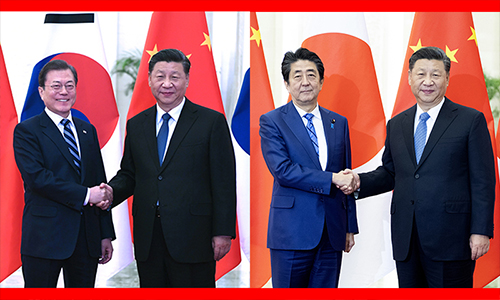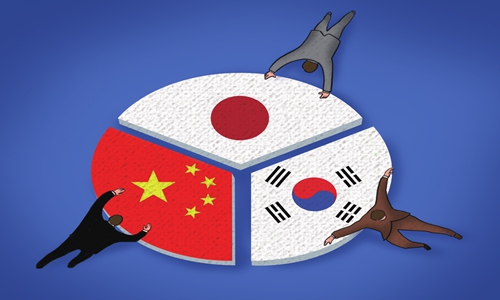China, Japan, S.Korea strengthen relations in trilateral summit
Closer bonds weaken influence of Washington in Northeast Asia

Chinese President Xi Jinping meets South Korean President Moon Jae-in and Japanese Prime Minister Shinzo Abe respectively at the Great Hall of the People on Monday. Photos: Xinhua
Top leaders of China, Japan and South Korea met for a summit in Beijing on Monday. Illustration: Liu Rui/GT
Chinese observers hailed the summit as a milestone since the annual summit was launched in 1999, setting the tone for a closer and deeper partnership in the coming years amid rising trade tensions and worries over the Korean Peninsula.
Chinese President Xi Jinping first met South Korean President Moon Jae-in in the Great Hall of the People on Monday, calling for a deepening and developing strategic cooperative partnership, accommodating each other's core interests and major concerns and lifting bilateral ties to a higher level, according to the Xinhua News Agency.
The two countries' positions and interests on the Korean Peninsula were consistent and both insisted on the core ideals of maintaining peace and stability while advocating solving problems through dialogue, Xi said.
Moon also affirmed that both Hong Kong and Xinjiang affairs are China's internal affairs, understood China's positions on important issues and supported free trade while expressing willingness to enhance communication and collaboration with China in regional and international affairs, the report said. China-Japan ties currently face important development opportunities, Chinese President Xi Jinping said Monday when meeting Japanese Prime Minister Shinzo Abe, according to Xinhua.
Xi said China is willing to maintain close communication with Japan and strengthen political guidance to push the two countries' relations to a new level and better benefit the two peoples.
China and Japan are heading toward a good orientation, playing an active role in regional and global peace, stability and prosperity, Abe said during the meeting. And the Japanese side highly values and expects Xi's official visit to Japan in the spring of 2020.
The leaders met ahead of the Eighth China-Japan-South Korea leaders' meeting that kicks off on Tuesday in Chengdu, capital of Southwest China's Sichuan Province.
This year's trilateral summit will be held at a time when South Korea and Japan - two Asian economic powerhouses - are embroiled in a bitter trade war and uncertainties remain despite an agreement on the text of a phase one trade deal reached by the US and China.
Korean Peninsula tension reemerged with a year-end deadline set by North Korea for the US to change its policy, according to media reports.
"This trilateral meeting is highly likely to become the most important one" since trilateral cooperation began in 1999, Lü Chao, a research fellow at the Liaoning Academy of Social Sciences, said on Monday.
"The US-initiated trade war against China has not been settled while there are rising tensions between Japan and South Korea. In addition concerns over the Korean Peninsula have attracted global attention, making this meeting more urgent," Lü said.
Tensions between North Korea and the US are rising again as the year-end deadline approaches and Washington is watching Pyongyang closely for signs of a possible missile launch, deemed a "Christmas gift," returning to the path of confrontation, the Chinese analyst said.

Over the past few years, there have been growing conflicts on issues in Northeast Asia, agitated by the intervention of the US, according to analysts.
Improving mutual political trust among the three sides will also help move toward a free trade agreement in line with the core interests of Northeast Asian countries.
China, Japan and South Korea have agreed to push on with the signing of the Regional Comprehensive Economic Partnership agreement in 2020 and accelerate negotiations on a China-Japan-South Korea free trade agreement (FTA), top officials from the three parties said on Sunday.
"China-Japan ties are in the process of improving, and there are some signs showing that Japan-South Korea ties have been warming up lately. If officials could make a clear timetable for FTA, it would play a significant role in making major breakthroughs in free trade pact," Wu Xinbo, head of international relations at Fudan University in Shanghai, said Monday.
Strengthening ties for China with Japan and South Korea, major allies of the US, will make Washington unhappy, analysts said. Washington will come up with measures to interfere with the trilateral talks, for example, by putting economic pressure on Japan or playing national security cards, they said.
"It's important to work through some major divergences with Japan by not avoiding sensitive issues including disputes over the sovereignty of the Diaoyu Islands and Japan's Constitution debates," Wu said. "And the two sides should contain some divergences as the improved bilateral ties are in line with the general trend," Wu noted.
US role
Increasing disputes in Northeast Asia rooted in US interference in regional affairs. For example, the US deployment of Terminal High Altitude Area Defense (THAAD) has seriously jeopardized China-South Korea relations, experts said.
Washington would see deepening trilateral cooperation as unfavorable for its Indo-Pacific Strategy.
In light of US policies toward its allies, it was high time to reevaluate the urgency of regional cooperation, analysts said.
"If the three countries make concrete progress, US politicians like Secretary of State Mike Pompeo and Vice President Mike Pence would feel the pain," Li Haidong, a professor at Institute of International Relations of China Foreign Affairs University in Beijing, said on Monday.
"But they could not take any effective measures to damage the trilateral cooperation considering the presidential campaign in 2020."
China should continue playing an important role as an arbitrator or middle-man in helping ease tensions, particularly trade spats between Japan and South Korea, and the three countries could come up with a consensus and weaken interference by the US in Northeast Asia, Lü said.
Newspaper headline: China, Japan, S.Korea deepen ties